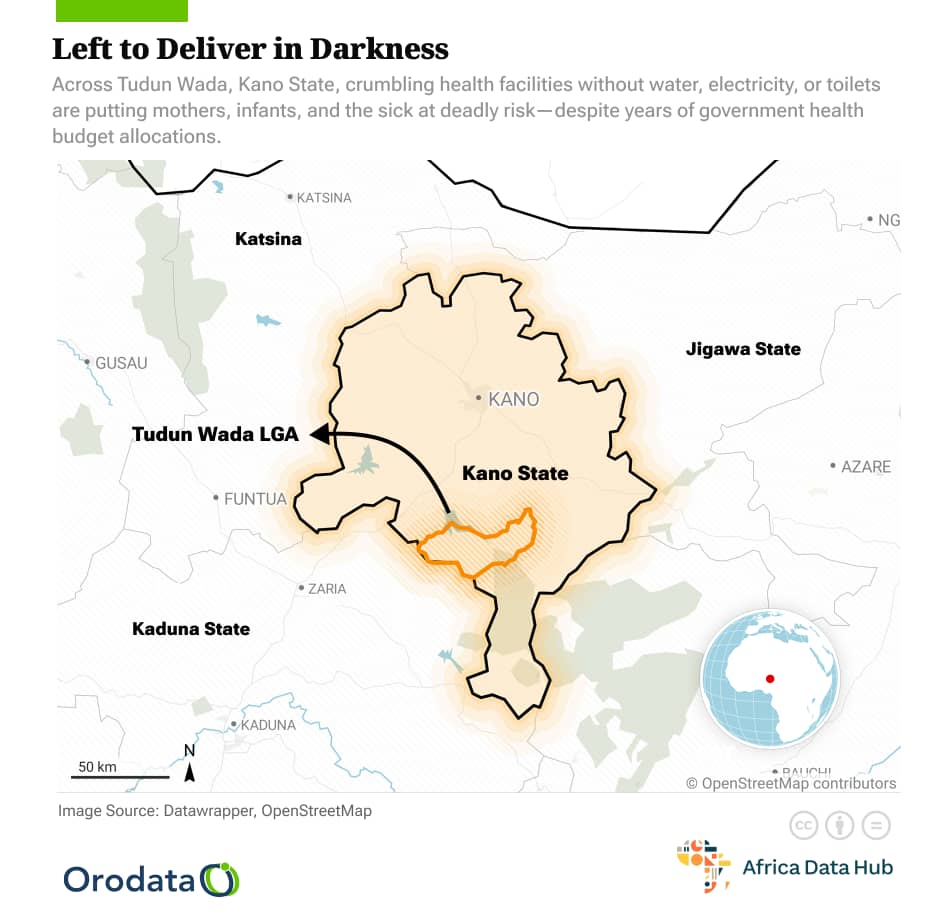Across Tudun Wada LGA in Kano State, broken promises, decaying infrastructure, and absent amenities leave patients in remote communities exposed to deadly health risks.
By Mariya Shuaibu Suleiman, May 2025
Despite Kano State’s recurrent budgetary commitments to primary healthcare, thousands of rural residents in Tudun Wada Local Government Area are being left to suffer and die in health centers without the most basic of human needs: water, light, or toilets.
In this investigation, Mariya Shuaibu Suleiman documents how these preventable gaps in infrastructure have turned Primary Healthcare Clinics (PHCs) in Farin Ruwa, Rugu Rugu, and Yar Maraya into hazardous zones, risking the lives of mothers, infants, and the sick alike.
“I Almost Gave Birth in the Bush”
In Yar Maraya, a village tucked deep within Tudun Wada LGA, 22-year-old Maryam Dahiru thought she was prepared for her second delivery. But what awaited her at the Yar Maraya PHC was nothing short of a nightmare.

“There was no water to clean me, no electricity. The staff had to go to the far neighborhood well to fetch water.” She said, recalling the day she was rushed to the centre in labor. “At that moment, I wanted to relieve myself but there was no functional toilet .”

Maryam eventually gave birth under a local and unreliable solar at the PHC. The PHC had no delivery kit, inadequate disinfectant, and no electricity.
Her story echoes across the villages of Farin Ruwa and Rugu Rugu, where PHCs exist in name but lack the basics that define even the most rudimentary care.
Inside the PHCs: “We Manage What Shouldn’t Be Managed”
When this reporter visited Farin Ruwa PHC in April, the surroundings reeked of urine. The walls were discolored with mold, the toilet, an open pit was completely unusable, and the health workers fetched water from a nearby stream when patients needed it.

“It’s risky,” admitted by a staff at the facility. “But what option do we have? We deliver babies here in darkness. Sometimes, we refer cases just because we can’t see clearly.”
In Rugu Rugu, the PHC has few staff members that double as cleaners.
The facility’s roof leaks, and patients avoid the toilet area entirely ,preferring instead to go into nearby bushes.
What the PHC In-Charges Say
Despite the dire conditions, the heads of the three PHCs told this reporter that no deaths have occurred in their facilities, although they emphasized how difficult it is to carry out their duties without water, power, or toilets.

At Farin Ruwa and Yar Maraya, there is no electricity at all, not even a backup generator. In Rugu Rugu, there is a NEPA connection, but the power is so erratic that health workers say it is effectively useless during emergencies.
All three PHCs fetch water from far-off neighborhood wells. While Rugu Rugu and Yar Maraya have wells within the premises, their in-charges confirmed that these have dried up and no longer produce water. Staff often resort to using unhealthy water sources, but, as one put it, “we do not have a choice.”

In Yar Maraya, the situation has become so severe that the facility has stopped admitting women in labor altogether. “We have no water, no electricity, no toilet, and not even a midwife or qualified nurse on duty,” the in-charge said. “We can’t risk it anymore.” This has forced pregnant women to travel miles to deliver in town, a dangerous delay in emergency situations.
Basic Needs Denied: A Breeding Ground for Disease
Across these three facilities, the absence of clean water, sanitation, and electricity is contributing to preventable illnesses. According to Dr. Umar Mamman, a public health physician based in Kano, such environments are breeding grounds for infections, particularly during childbirth.
“Unhygienic delivery conditions can lead to sepsis in both mothers and babies. Lack of running water and lighting increases complications, while poor waste disposal contributes to cholera and diarrheal outbreaks,” he said.
Promises Made, Promises Broken
In 2023, Kano State Government earmarked N6.2 billion for PHC revitalization, including water and solar electrification projects. Yet in Farin Ruwa, Rugu Rugu, and Yar Maraya, none of these projects materialized.
A recent audit by Orodata Science and Civic Tech showed that only 14% of rural PHCs in Kano have functioning toilets, and just 22% have any form of electricity.
The Basic Health Care Provision Fund (BHCPF), designed to guarantee access to essential services, has also failed these communities. “There is zero transparency,” said Nasiba Abdul, a civic advocate in Kano. “Nobody is tracking where the money goes.”
Yar Maraya Community Lost Hope
Yar Maraya community women in the area told this reporter that they have begun opting for traditional birth attendants again, not by choice, but because the PHC is now a place of fear.
A health worker in Rugu Rugu summed it up bluntly: “If you fall sick at night, you better pray hard. No light, no nurse, and sometimes, no hope.”
A Deadly Gap That Can Be Closed
As government officials boast of achievements in public healthcare, villagers in Tudun Wada are still giving birth in darkness, washing wounds with stream water, and falling sick from preventable infections.
The Kano State government should be committed to universal healthcare, begin by addressing the obvious: water, light, and sanitation.
Until then, PHCs like those in Farin Ruwa, Rugu Rugu, and Yar Maraya will remain not just under-equipped, but deadly.
This story was produced for the Frontline Investigative Program and supported by the Africa Data Hub and Orodata Science.


